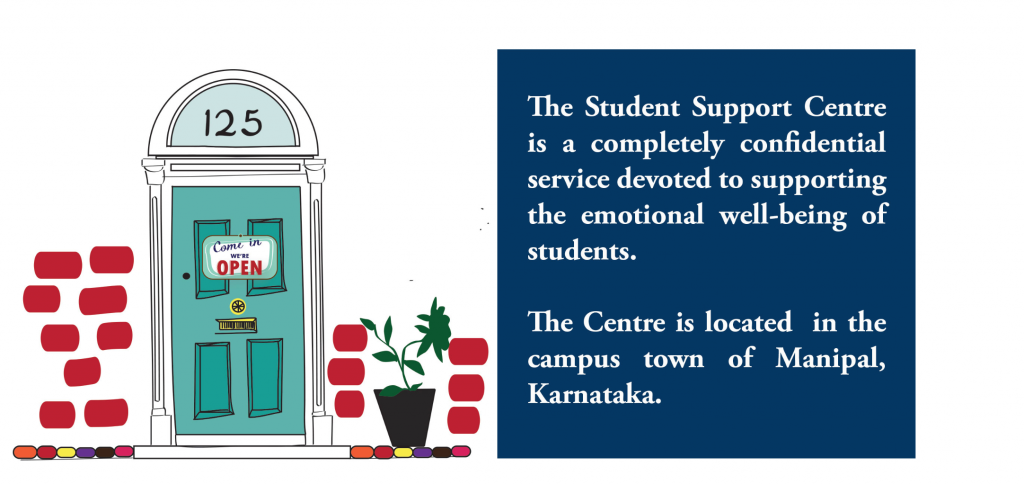Lessons From a Student Support Centre, One Year On
By Amrita Tripathi
The Manipal Student Support Centre recently completed a year of operations. Set up as part of the Manipal Academy of Higher Education, and funded by the Academy, with services exclusively for students (and covered by student insurance), it could be a viable model for other educational institutes in India. I checked in with Dr Gayathri Prabhu, Associate Professor Manipal Centre for Philosophy and Humanities, and the Coordinator of the Student Support Centre, for more. Do read on for insight into the Centre, and what you need to know about Mental Health.
1) What has the response in the student community been like to the setting up of this centre, over the past year?
The impetus and design for the Student Support Centre at Manipal (ssc.manipal.edu) was led by student initiative from its early days. We started with an outreach event (a rock concert by F16s and Skrat!) and worked closely with student volunteers and mental health advocates in the student community.
The core format of the Centre is based on needs articulated by students — complete confidentiality, treatment delinked from hospital and academic records, a warm comfortable space with easy access, sessions with clinically trained psychologists, consultations with psychiatrists in a non-hospital setting, and no payments.
The Centre has also set up a Student Advisory Board which comprises student leaders from various institutes and departments on our campus, and they act as a peer referral and support system. One of our biggest lessons in this first year of the Centre’s functioning is that nothing is as effective as word-of-mouth goodwill and endorsements by students. It is because of this goodwill that we have a constant stream of new student-clients walking through our doors, and we would like to continue to work at retaining their trust.
Apart from the student community, the Centre owes much to the support of the administration and the psychiatry department of our hospital, and their willingness to support this student-centric model.

2) What are some common issues that come up? Without compromising on anyone’s privacy, could you share 2-3 major issues that come up?
As you know, mental health issues fall on a wide spectrum and WHO has identified those aged between 15 to 29 years to be among the most vulnerable. As a society, and in university spaces, we haven’t given enough thought to the kind of pressures faced by people in their late teens and early twenties. This is when many young people are struggling with the transition to adulthood, trying to form an identity away from family, coping with living on their own, and managing social change. Hence one hesitates to respond entirely in a diagnostic fashion. Perhaps depressive and anxious features, personality issues and lifestyle disturbances are among the more common concerns that need addressing.
3) If there were 4 or 5 things about mental health and illness that you wished everyone knew, what would those be?
- Mental health is about learning and practising certain life skills, realising when to seek support, and finding the best resources for whatever health setbacks we invariably face. Nobody is born with these instincts and skills — it is teachable and learnable. One has to work towards being a healthy functional adult.
- Mental health is not a matter of ‘will power’, and the best of us will flounder at times. Ask for help — it shows maturity and strength. Sometimes it takes time to find the right mental health professionals and resources that work for us. One needs to persist.
- Illness of the mind is like any other illness. Speak up to family and friends, and don’t feel ashamed. Not everybody will empathise, but that’s okay — the telling is important, because you are standing up for yourself.
- If you know someone who is struggling with their mental health, please don’t dole out platitudes. ‘You can do it, snap out of it, get a grip on yourself, get some exercise’ – are unhelpful words for someone who is very ill. If they could get better so easily, they would have done so already. Listen, acknowledge, guide towards professional help, stay still, stay around. If you wish to walk away, do so with grace, with honesty, and restrain your judging self.

ALSO READ: WHAT’S STRESSING OUT DELHI’S GIRLS?
4) Do you think this (the Student Support Centre) is a model that can be replicated in educational institutions, and what are some of the challenges and opportunities within the educational system?
Absolutely – there is no doubt in my mind that this model can and should be replicated. We invite other educational institutions to join us in supporting the mental wellbeing of students. A couple of them have already contacted us. This is a long-term commitment that will take administrators with a progressive outlook towards mental health, trained and gifted mental health professionals, access to psychiatrists, affordable (preferably free) healthcare, complete confidentiality and sustained support in a comfortable atmosphere.
As we know, there is a dearth of trained mental health professionals in the country, and it is vital to step away from a paternalistic or moralistic or conservative framework in how we address students — (we need) to treat them as adults, with respect and consideration. For the most part, educational authorities quickly equate mental health with academic pressures/performance, but the ground reality is much more complex than that. In addition to being made aware of this, the entire community needs to be involved in creating an empathetic atmosphere and approach to mental health. We need to be able to link emotional wellbeing with a larger environment of cultural expression, including art, music, theatre, etc. The Student Support Centre at Manipal is one step in this direction and we hope others will join us.
Dr Gayathri Prabhu is also the author of ‘If I Had to Tell It Again’ and other books. You’ll find more on her website, and more about the Manipal Student Centre here
Feature Image Courtesy: Raw Pixel



